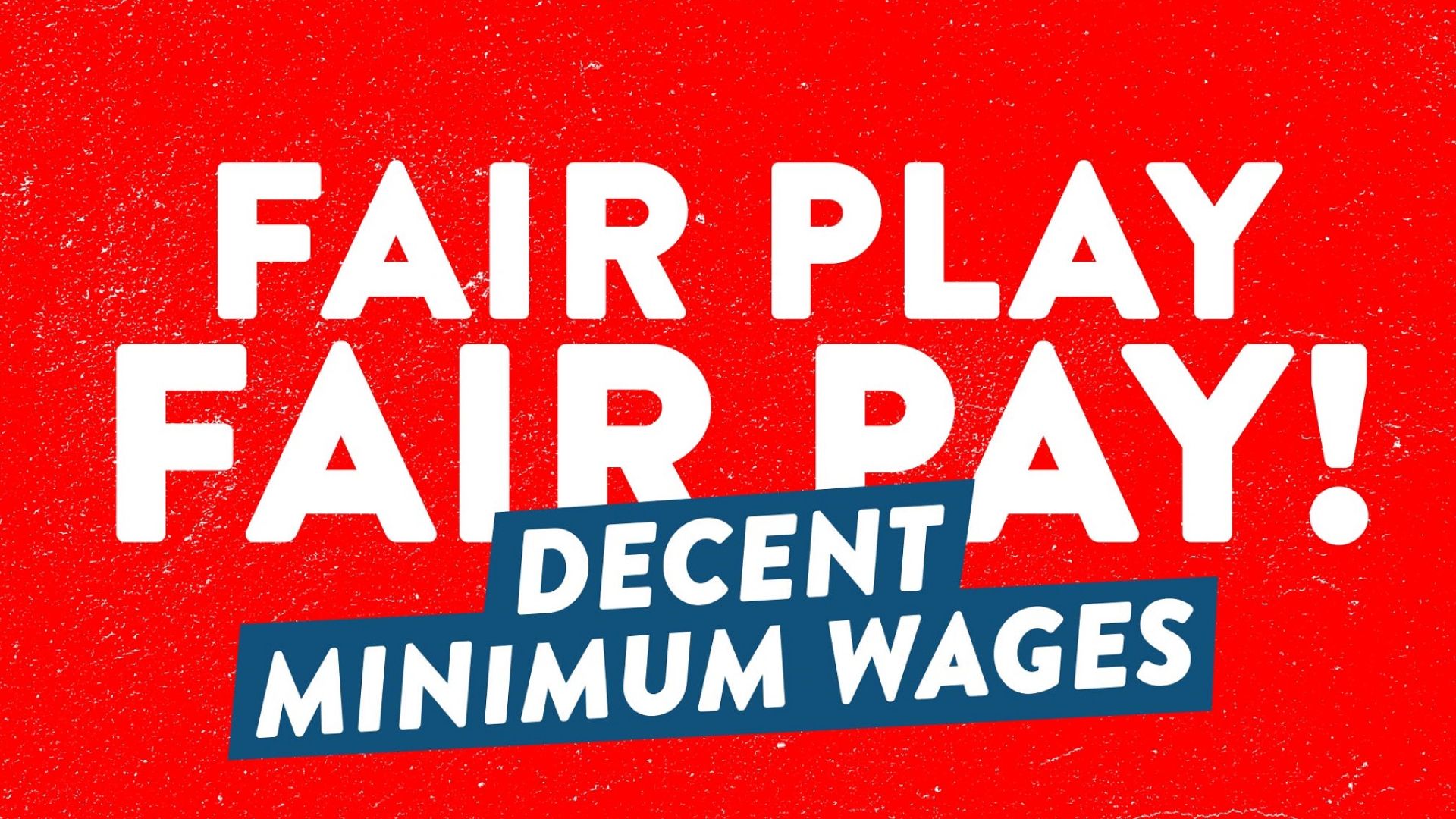Social rights are the bedrock of a just and inclusive society – ensuring that every individual is treated equally, provided equal opportunities and protected from discrimination. Encompassing vital areas such as education, healthcare, housing, employment, social security and cultural access, these rights empower people to live meaningful lives. They guarantee access to quality education, healthcare, safe housing, fair employment, social support and enriching cultural experiences. By fostering social cohesion and reducing inequalities, social rights create a harmonious and thriving community for all.

Work must pay. One in six Europeans doesn't earn enough to make ends meet. Even though they work a tough 40-hour week, or put in even more hours – with prices skyrocketing – many Europeans cannot enjoy a decent standard of living. We are talking about the very people who keep our societies afloat: supermarket cashiers and shelf-stackers, cooks and waiters, lorry drivers and care workers, farm hands and crèche workers. These people are both undervalued and underpaid.
The Directive on Adequate Minimum Wages will finally end this scandal of workers in poverty. At the same time, we are strengthening collective bargaining as the best way to guarantee decent working conditions throughout the EU. Europe’s old misguided recipe of lowering wages and breaking up sectoral collective agreements hurts people. It's time for change and we are leading the charge to make it happen: wages must go up and workers’ bargaining power must grow. Minimum wages should function as a threshold of decency. Setting them at an adequate level only works when taking into account the cost of living. Fair minimum wages will benefit countless Europeans by narrowing the gender pay gap and fighting inequality.

Today, women still earn on average 14.1% less than men in comparable positions. A true scandal in the 21st century.
We support Commissioner Helena Dalli’s efforts to introduce a pay transparency directive – an essential first step to end pay differences between men and women, which remain far too high. The directive will apply to all employers, in both the private and public sectors, and to all workers. A large majority of EU countries have no legal framework on pay transparency. With new proposed pay transparency measures, it will be possible to identify gender biases in pay structures or inadequate salaries. The new measures will allow workers to detect pay discrimination and to claim their rights. This will benefit all workers, not just women.
The pandemic has disproportionally affected women, especially those with low-paid and insecure jobs. This is why we now need to redouble our efforts to end the gender pay gap and support women’s economic security. But this is just one part of the problem. The next steps must be to introduce fair minimum wages in the whole of the EU, revise the Directive on equal opportunities, promote the equal treatment of men and women at work and adopt the Women on Boards Directive.
Uber and co like to sell the idea of a third way between classic forms of employment and self-employment. And indeed, who wouldn’t be attracted by a job that promises quick money, flexible hours and being your own boss? But the risks can’t simply be placed squarely on the shoulders of workers and society while platform companies get rich and take no responsibility whatsoever.
Today, if Uber drivers do not have any customers, they get stuck with the bill for their fuel or their leasing contract. If Deliveroo drivers have a bike accident while working, they are left without sick pay. If Helpling cleaners are harassed, who do they turn to? And who will pay their pension when the time comes? At the same time, traditional companies who offer their employees full social protection and decent pay, face unfair competition from platform companies undercutting social rights.
To ensure technological progress translates into social progress for all, we must pass laws that guarantee platform workers have the same rights as any other worker and that the same rules apply to platform companies as they do to any other company. The key to achieving this is inverting the burden of proof. Companies should be obliged to prove that they are really dealing with independent, self-employed entrepreneurs. If they can’t prove that, then we should assume an employment relationship exists with the platform company, with all the employer’s responsibilities and workers’ rights that this implies. It’s time to guarantee workers’ rights in the digital age.
It's so convenient: with one tap on our smartphones we can order food to our home or a ride to wherever. But the apps neatly hide the real story of the platform workers, who are too often deprived of fair wages, denied social insurance and refused paid leave and decent working conditions. While digitisation is turning our world upside down, changing the way we work, produce, consume, love and live, we must ensure that workers are not the ones paying the price. This is why we are fighting for platform workers to be considered as employees with all applicable rights, unless platform companies can prove they are dealing with genuine self-employed people. Through this ‘rebuttable presumption’ of an employment relationship, we can ensure that platform workers get the rights they should be entitled to, such as minimum wages, social insurance, health and safety protection, sick leave, as well as the right to organise and engage in collective bargaining.
The S&Ds have always strived to ensure that the EU puts people first and we insist that social rights must be granted the same priority status as economic and environmental goals. Two years after the Porto Social Summit – where we set key commitments and targets – the S&D Group recently returned to Portugal to further strengthen our fight for a prosperous future for all Europeans.
In Gothenburg in 2017, our political family delivered the European Pillar of Social Rights. Four years later, the Porto Social Summit adopted an action plan with concrete commitments and targets. In May of 2021, we focused on enhancing the social pillar as well as tackling the social impact of the Covid-19 pandemic and the war in Ukraine.
The Porto summit defined three main social targets by 2030: minimum 78% employment rate in the EU, at least 60% of adults in training courses every year and reducing the number of people at risk of social exclusion or poverty by at least 15 million – including five million children. But this is still not enough. We are calling for more targets, such as quality job creation, at least 80% collective bargaining coverage by 2030, zero deaths at work and the eradication of homelessness by 2030.
We want a Europe where all workers earn a decent wage, all families can afford a place to live and no child grows up in poverty. The future of Europe will be social or there will be no more Europe as we know it and as we want it. To achieve this, we need to step up efforts to deliver on our promise to ensure a decent life and decent work to all Europeans. This is what the social pillar is all about.
The economic fallout of the Covid-19 pandemic is creating huge new obstacles for young people trying to find quality jobs. The danger of exploitation is very real. It’s time to call unpaid internships by their real name: a form of labour exploitation and a violation of young people's rights. This is why we are campaigning to get unpaid internships and traineeships banned in European labour markets. We stand for the right of millions of young Europeans to be treated fairly in the workplace and to improve their economic and social conditions. Youth rights belong at the top of the European Union's agenda.

By 2030, we can cut youth unemployment in Europe by at least 50%! The Youth Guarantee, pushed through by the Socialists and Democrats after the last economic crisis, has helped more than 10 million young people into jobs. A success story we are proud of and a good tool we can adapt to new challenges. Now we need to step up – with investment to create quality jobs and a ban on unpaid internships, which exploit young people and violate their rights. It’s time to put youth rights at the top of the EU’s agenda.
While asbestos has been banned in the European Union since 2005, and even before that in many member states, many buildings built before still contain asbestos, and 80% of work-related cancers recognised in the Union are linked to this substance.
It is estimated that 4.1 to 7.3 million workers are exposed to asbestos. 97% of these workers are in the construction sector, including related occupations such as roofers, plumbers, carpenters and floor layers, and 2% are in the waste management industry.
The S&D Group firmly believe that no time should be wasted, and no effort spared, to limit workers’ exposure to this highly dangerous substance – the main cause of work-related cancers in Europe. It is time to deliver on our commitment to the vision of no work-related deaths.
In September 2022, the European Commission proposed the revision of the 2009 directive designed to protect workers from asbestos-related risks. Its proposal fell short of our expectations. We have been calling for a rigorous revision of the asbestos legislation to ensure proper protection against work-related cancers. This requires much stricter exposure limits, set at 1000 fibres per m3, as we urged in the Parliament’s resolution adopted in October 2021. The limit proposed by the Commission – and so far accepted by EU member states – is ten times higher, so their ambition is ten times lower. We will work tirelessly to reach our goal of zero work-related deaths in Europe.

80 million Europeans lack affordable housing. Every day, the number of people who are struggling to pay their rent or the energy bills to heat their homes is growing. Increasingly, middle-income groups are also being affected by a housing crisis that has severely worsened during the Covid-19 crisis. Housing is a human right and all Europeans must have access to decent and affordable housing.
The rampant housing crisis is also a market failure. Housing has become an object of speculation. At the same time, the ‘Airbnb effect’ is speeding up the spiral of rental prices and gentrification to a level where local residents can no longer find and afford housing. We must ensure there is a well-regulated market capable of providing affordable housing to all. Solving the housing crisis will become a test case for the solidarity and the cohesion of our society. Leaving no one behind means first and foremost putting a roof over everyone’s heads. To solve the housing crisis, we call for an integrated EU strategy to create a favourable framework for national, regional and local authorities.
We propose a number of progressive policies such as rental price-control measures, exclusion of social spending from fiscal policies, rules for hospitality services to avoid 'touristification', the revision of the housing cost overburden rate, inclusion of housing sustainability criteria and support for the circular economy. Public housing policy should be excluded from the competition and state aid rules. We demand that housing affordability must be included in the European Semester and that National Affordable Housing Plans should be incorporated in the National Reform Programmes. Everybody deserves a place to call home.














